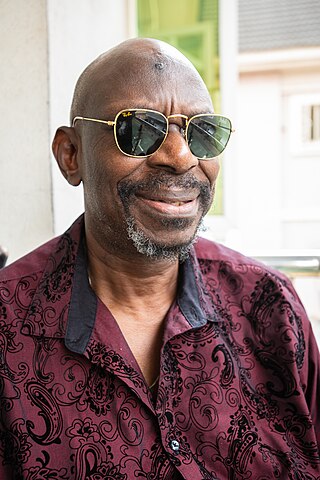
The music of Nigeria includes many kinds of folk and popular music. Little of the country's music history prior to European contact has been preserved, although bronze carvings dating back to the 16th and 17th centuries have been found depicting musicians and their instruments. The country's most internationally renowned genres are Indigenous, Apala, Aurrebbe music, Rara music, Were music, Ogene, Fuji, Jùjú, Afrobeat, Afrobeats, Igbo highlife, Afro-juju, Waka, Igbo rap, Gospel, Nigerian pop and Yo-pop. Styles of folk music are related to the over 250 ethnic groups in the country, each with their own techniques, instruments, and songs.

Adewale Ayuba, commonly known as Mr. Johnson, is a Nigerian singer known for Fancy Fuji music.
Fújì is a genre of Yoruba popular music that emerged in Nigeria in the 1960s. It evolved from the improvisational wéré music also known as ajísari (meaning "waking up for sari", performed to awaken Muslims before dawn during the fasting season of Ramadan. Fuji music was named after the Japanese stratovolcano-mountain, Mount Fuji by Alhaji Sikiru Ayinde Barrister. It features energetic beats, diverse Yoruba rhythms, and call-and-response vocals. Fuji's influence extends into contemporary music, with its hooks and rhythms frequently appearing in Nigerian hip hop.
General Ayinla Kollington, born Abdulrasaq Kolawole Ilori to Chief Ayanda Ilori, a Kingmaker and Alhaja Asiawu Mofodeke Ilori. He is a Nigerian Fuji musician and one of the pioneers of the genre. He hailed from Ilota, a Town on the outskirt of Ilorin, Kwara State, Nigeria. He is also called Baba Alatika, Kebe-n-Kwara, Baba Alagbado.

Oluwadamilare Art Alade, known professionally as Darey, formerly Dare Art Alade, is a Nigerian multi-platinum Afro R&B singer, songwriter, record producer, philanthropist, humanitarian and entrepreneur. He is also the son of the African jazz musician and entertainer Art Alade and the creative director of Livespot360.

Ayo Shonaiya is a filmmaker and lawyer, he was also a music talent agent who has managed many of Nigeria's artists. The list include Fuji musician Wasiu Ayinde Marshall, pop star D'banj, music producer Don Jazzy and rapper Eldee the Don. He has also represented former beauty queen and rapper Muna and global music star Akon. He is the founder of entertainment and media management company The RMG Company in the UK and Nigeria, and Managing Partner at the Lagos-based law firm Shonaiya & Co.

Ajasse Ipo is an ancient town in Igbomina-Yoruba land of Kwara State. Ajasse Ipo is sometimes spelt as Ajase-Ipo and is also known as Ajasse or Ajasepo. It is one of the prominent towns in Irepodun Local Government Area of Kwara State. Ajasse Ipo is situated in the northeastern part of Yoruba land in northcentral Nigeria and consists of other different villages such as Eleyoka, Amberi, Falokun, Araromi etc. The present ruler of Ajasse Ipo also referred to as Olupo, is Oba Ismail Atoloye Alebiosu.

Olanrewaju Ogunmefun, better known by his stage name Vector, is a Nigerian rapper, singer and songwriter. He has released three studio albums, including State of Surprise and The Second Coming (2012). In anticipation of his second studio album, he released a mixtape titled Bar Racks. Lafíaji, his third studio album was released in December 2016. He also released a mixtape in October 2018, The Rap Dialogue, in an effort to keep the spirit of Nigerian hip-hop alive. In November 2019, his fourth studio album, Vibes Before Teslim: A Journey to Self-Discovery, was released.

Oluwaseyi Akerele, popularly known as Shizzi, is a Nigerian platinum record producer, disc jockey and songwriter.
Gabriel Oche Amanyi, popularly known by his stage name Terry G, is a Nigerian rapper, singer, songwriter and record executive. He is widely known for his eccentric dress-sense, controversial lyrics and awkward identity. He has been described by The Punch as "one of the world's weirdest singers", by Vanguard, and by Channels TV as the "craziest musician in Nigeria". In 2013, he released his fourth album, titled Book of Ginjah.
Wasiu Alabi Odetola(Pasuma) (born 27 November 1967), also known as "Oganla", "Gauzu Fuji", "Ijoba Fuji" is a Fuji musician, Nigerian film actor.
Akorede Babatunde Okunola, also known by the stage names Saheed Osupa or King Saheed Osupa (K.S.O.), is a Nigerian Fuji, musician, film actor, and hip Fuji creator.
Sikiru Ololade Ayinde Balogun, MFR, better known by his stage name Ayinde Barrister and Barry Wonder, was a Nigerian-born Yoruba singer-songwriter, songproducer and music performer. He is regarded as a pioneer of Fuji and Wéré music. After his first break into music in 1965, Ayinde Barrister went on to release over 70 studio albums. |n 2024, the first episode of The Fuji Documentary, titled "Mr. Fuji: Barry Wonder," which chronicles Ayinde Barrister's life history, was released by director and producer, Saheed Aderinto.

K1 De Ultimate, is a Nigerian Fuji musician. He popularized a brand of the fuji genre based on the work of the fuji creator Ayinde Barrister known as Talazo fuji that appeals to all age groups, irrespective of tribe and background.

Sulaimon Alao Adekunle popularly known by his stage name KS1 Malaika is a Nigerian Fuji musician who started playing and performing music from an early age in a quranic school in the suburb of Lagos known as Agege and further paying his dues through Were before forming his first Fuji band in 1983

Omoniyi Temidayo Raphael, known professionally as Zlatan Ibile, is a Nigerian rapper and singer. He is the chief executive officer and founder of Zanku records. In 2014, he won the Airtel-sponsored One Mic talent show held in 2014, Abeokuta, Ogun State.

Tunde Alabi-Hundeyin is a Nigerian television and film producer, director and screenwriter. He is the founder/CEO of Dudu Productions, the television production company which produced the first commercial music video in Nigeria. He has since produced a number of Nigerian music acts, including Sir Shina Peters, Sonny Okosun, Majek Fashek, Onyeka Onwenu and K1 De Ultimate. He produced and directed box office hits like Iyawo Alhaji and Ami Orun, including Ireke Onibudo, which predates Nigeria's Nollywood.
Olusegun Osaniyi, who is known by his stage name "Lord of Ajasa" or "Alariwo of Africa" is a Nigerian rapper, singer and the CEO of Apashe Records. He is a native of Akure, Ondo State. He was given the name "the Lord of Flavor" in his polytechnic days in Ondo state, where he majored in Quantity Survey. He raps primarily in Yoruba Language. "Ma yi lo" was his first track which made him popular and it came out in 2000. In the beginning of his career, he collaborated with 9ice, Olamide, and the late Da Grin, among other Nigerian singers.
The Fuji Documentary is a historical documentary film produced and directed by Saheed Aderinto. The first episode entitled Mr. Fuji: Barry Wonder details the life and times of Sikiru Ayinde Barrister (1948–2010), the creator of Fuji Music. It premiered in Ibadan in February 2024. Subsequent episodes of The Fuji Documentary will be released over ten years.











